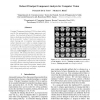152 search results - page 27 / 31 » Recursive least squares dictionary learning algorithm |
111
Voted
ICML
2007
IEEE
16 years 3 months ago
2007
IEEE
Kernelizing partial least squares (PLS), an algorithm which has been particularly popular in chemometrics, leads to kernel PLS which has several interesting properties, including ...
138
click to vote
BMCBI
2006
15 years 2 months ago
2006
Background: Non-negative matrix factorisation (NMF), a machine learning algorithm, has been applied to the analysis of microarray data. A key feature of NMF is the ability to iden...
93
Voted
BMCBI
2007
15 years 2 months ago
2007
Background: Odorant binding proteins (OBPs) are believed to shuttle odorants from the environment to the underlying odorant receptors, for which they could potentially serve as od...
112
click to vote
ICCV
2001
IEEE
16 years 4 months ago
2001
IEEE
Principal Component Analysis (PCA) has been widely used for the representation of shape, appearance, and motion. One drawback of typical PCA methods is that they are least squares...
132
click to vote
CIKM
2011
Springer
14 years 2 months ago
2011
Springer
Traditional feature selection methods assume that the data are independent and identically distributed (i.i.d.). In real world, tremendous amounts of data are distributed in a net...

